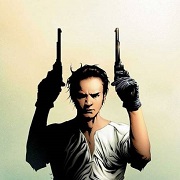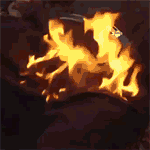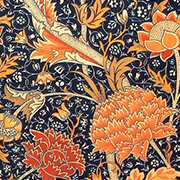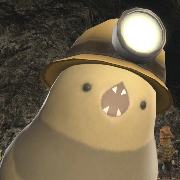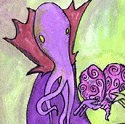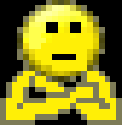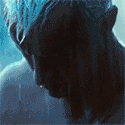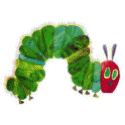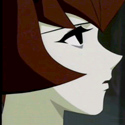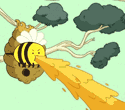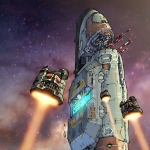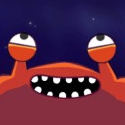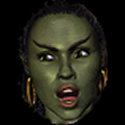Argali posted:Why is the hardcover going for nearly $1,000 on Amazon? It was published by Gollancz, a British publisher, so it was not (directly) available in the US. Further, Gollancz has a tendency to have tiny print runs for hardcovers from unproven writers, so that natural scarcity only adds to the price. Finally, sellers on the Amazon Marketplace are often loving insane with their prices. There's a used copy for $60, and I see one copy on eBay for roughly the same.
|
|
|
|
|

|
| # ? May 6, 2024 16:49 |
|
Would The Time Machine count as a post-apocalyptic story?
|
|
|
|
Mechafunkzilla posted:Would The Time Machine count as a post-apocalyptic story? I don't see why not. It deals with the remnants of humanity after some sort of world-changing event(s).
|
|
|
|
gnarlyhotep posted:I don't see why not. It deals with the remnants of humanity after some sort of world-changing event(s). That's probably a good starting point, then. It's probably the first massively popular depiction of a far future "Earth as dystopic wasteland" in English fiction.
|
|
|
|
John Charity Spring posted:Margaret Atwood's Oryx and Crake. A different kind of apocalypse from the usual, and it's a very personal tale that weaves together how the apocalypse actually happened and also what life is like after it. Thirding this. Some of the students may be familiar with some of her other books, as I know The Handmaidens Tale is often taught in fiction classes. Oryx and Crake is a great, interesting post-apoc novel with lots of stuff to talk about.
|
|
|
|
The Passage by Justin Cronin
|
|
|
|
Are there any good post-apocalyptic novels that don't involve: 1. Nuclear anything. 2. Aliens. 3. Vampires/monsters/mutants ?
|
|
|
|
Yes, and several have been mentioned in this thread. Like Margaret Atwood's books.
|
|
|
|
Ray Bradbury has a short and sweet story called, "And Soft Rains will Fall." http://www.dennissylvesterhurd.com/blog/softrain.htm There is an animated version, but I couldn't find it with a quick youtube search. Walter Miller, Jr. (the author of Canticle for Leibowitz) also put together an anthology of short post-apocalyptic stories in 1985 called "Beyond Armageddon." It includes a number of stories that would probably be suitable, many by well-known science-fiction authors. http://www.amazon.com/Beyond-Armageddon-Walter-Miller-Jr/dp/0803283156/ref=sr_1_5?ie=UTF8&qid=1357790591&sr=8-5&keywords=walter+miller I'd also say Oryx and Crake is worth examining - it is a much more recent take on an apocalypse and feels very topical. I don't know how far afield of traditional novels yhour friend would want to go, but life after an apocalypse is also a popular topic in a lot of comics and webcomics, many of which have less traditional approaches to the whole thing. Sionak fucked around with this message at 16:27 on Jan 10, 2013 |
|
|
|
John Charity Spring posted:Yes, and several have been mentioned in this thread. Like Margaret Atwood's books. I really, really cannot stand Atwood at all. Her dialogue is really bad, and the settings of hers that I've read(Handmaiden Tale, Oryx etc) are just drab low-budget Brave New World knockoffs where everything is vaguely dreary and "wrong" for some reason that the author never really explores. And subtlety isn't really her strongest suit, either. I mean christ, in Oryx the lower class people live in a place called "Pleebland". quote:I'd also say Oryx and Crake is worth examining - it is a much more recent take on an apocalypse and feels very topical. How is it topical? I mean, I couldn't seriously tell you what kind of issues the book examined other than "technology and corporations are bad, life is poo poo, roll credits."
|
|
|
|
Chillmatic posted:Are there any good post-apocalyptic novels that don't involve: Yes, two excellent recent novels: The Dog Stars, which deals with the end of most of humanity by some kind of plague but doesn't focus on that (it's a very beautiful take on friendship and love); and The Age of Miracles, which gets into what happens when the earth stops rotating.
|
|
|
|
Chillmatic posted:Are there any good post-apocalyptic novels that don't involve: Shitloads. If you want one that is a very modern take on the apocolypse, I'd suggest Last Light by Alex Scarrow.
|
|
|
|
Chillmatic posted:Are there any good post-apocalyptic novels that don't involve: Plenty. I would actually say that outside cold war era nuclear paranoia, one of the most common apocalyptic scenarios is global pandemic, and in more modern times, environmental collapse. There are probably two distinct classes of "apocalypse", one where depopulation IS the event and the natural world continues largely uninterrupted, thus survival is comparable to relearning hunter-gatherer skills and primitive farming, and the other where some force (aliens, war, volcanoes etc) is the cause of depopulation and creates a new natural order in which survival requires new skills that were not needed at other times in human history. Anyway, my recommendation for one of the latter, The Genocides by Thomas M. Disch. Gigantic 600 foot plants start springing up everywhere, growing faster than they can be destroyed, overrunning human endeavours and agriculture and reducing the population to isolated pockets of survivours. The meat of the story is how people deal with this on a personal and interpersonal level. This being Disch, whose work is characterised by an undercurrent of existential despair, the answer is "not very well actually, and with lots of fighting". Brian Aldiss' Greybeard is said to be good too, it's an example of depopulation without accompanying damage to much of the rest of the natural world (everyone becomes sterile because of botched nuclear testing). In a sparsely populated, lush and near human free world, most are distressed by the death of the human race but others take great joy in a reinvigorated natural world.
|
|
|
|
My favourite post-apoc book of recent times has been alt.human by Keith Brooke. I'm now going through Extinction Point by Paul Jones but I kind of think I want the female lead character to die in a horrible accident because she's terrible although the main idea behind the book is good.
|
|
|
|
Chillmatic posted:How is it topical? I mean, I couldn't seriously tell you what kind of issues the book examined other than "technology and corporations are bad, life is poo poo, roll credits." I think he meant "topical" in the sense that the issues it covers are more recent. Like there are clearly references to global warming, mass media and the internet, genetic engineering, etc. Not that these are completely new/unique topics but they feel like more "current" predictions of the future than you will read about in older stuff like Brave New World or 1984 or whatever. quote:I mean christ, in Oryx the lower class people live in a place called "Pleebland". I don't think it's literally called "Pleebland", that comes off more as an obnoxious nickname made up by snobby rich kids who live in the company owned suburbs, maybe their parents too.
|
|
|
|
Chillmatic posted:I really, really cannot stand Atwood at all. Her dialogue is really bad, and the settings of hers that I've read(Handmaiden Tale, Oryx etc) are just drab low-budget Brave New World knockoffs where everything is vaguely dreary and "wrong" for some reason that the author never really explores. The only Atwood book I've read is The Handmaid's Tale so I don't know about Oryx, but I don't see how you could say that the world in HT is wrong for unexplored reasons; it's pretty obvious what is wrong with the world, even if the history of how society came to be that way isn't fully explained. More on topic, someone recently asked for recommendations for post-apocalyptic and dystopian novels in the book recommendation thread, and I posted this list from the book club that I run. A lot of these are dystopian, and most of the books recommended in this thread are listed in here as well. I've not read everything on this list but I have highlighted my own favorites: elbow posted:
|
|
|
|
Um Y: The Last Man comic more or less is post apoc. I know its a comic but it explores the ideas pretty well.
|
|
|
|
elbow posted:The only Atwood book I've read is The Handmaid's Tale so I don't know about Oryx, but I don't see how you could say that the world in HT is wrong for unexplored reasons; it's pretty obvious what is wrong with the world, even if the history of how society came to be that way isn't fully explained. You're missing Kim Stanley Robinson's The Three Californias Trilogy, consisting of The Wild Shore, The Gold Coast and Pacific's Edge.
|
|
|
|
Sionak posted:Ray Bradbury has a short and sweet story called, "And Soft Rains will Fall." http://www.dennissylvesterhurd.com/blog/softrain.htm There is an animated version, but I couldn't find it with a quick youtube search. Ugh, reading is for *squares*. Why not listen to the story as broadcast on Dimension-X: http://www.thetwilightzonenetwork.com/home/2011/6/7/dimension-x-there-will-come-soft-rainszero-hour.html 
|
|
|
|
Guy A. Person posted:I think he meant "topical" in the sense that the issues it covers are more recent. Like there are clearly references to global warming, mass media and the internet, genetic engineering, etc. Not that these are completely new/unique topics but they feel like more "current" predictions of the future than you will read about in older stuff like Brave New World or 1984 or whatever. Exactly what I meant, yes. I didn't grow up with the threat of nuclear annihilation, so post-apocalyptic books about a nuclear wasteland don't seem quite as likely. But, a future where the world has become gradually warmer and genetic engineering has gone crazy? That is a very logical extension of trends that we can see right now. Chillmatic, if the book didn't work for you, that's one thing, but even the "corporations are evil and hold too much power" is an interesting contrast to the "governments will destroy us" subtext of most apocalyptic fiction of the 80s and earlier. For a class looking at different schools of thought on fictional apocalypses, I think it'd be really cool to see how the attitudes change over time. Personally, I really appreciated how much research Atwood put into the biological side of things, too. I also got the impression that no one who lived outside the compounds referred to it as "Pleebland" - a lot of the scientists are pretty callous, so that didn't really jump out at me at all. Sionak fucked around with this message at 18:57 on Jan 18, 2013 |
|
|
|
I read a pretty good one back in the day called "The Last Ship". It was about a US Navy destroyer participating in a nuclear strike and dealing with the aftermath. As you can imagine it had a tone very similar to "On the Beach", but that's not a bad thing.
|
|
|
|
I would add "One second after" to this list. I might even add the hater series by Moody.
|
|
|
|
I'm surprised nobody has mentioned Gene Wolfe's "the book of the new sun", in which the sun is fading due to <spoiler>, and the earth is unable to support as large a population as it did before. This is set in the far future. This book was sort of based on Jack Vance's "tales of a dying earth". The omnibus I have of that also contains the 2 cugel books "eyes of the overworld" and ... whatever the other one is called. The jack vance world is magical, hilarious, and yes! it does contain sort-of mutants! Hooray!
|
|
|
|
Would 'City' by Clifford Simak count? It's pretty different, with evolved dogs telling legends about the end of humanity.
|
|
|
|
I just finished "On the Beach". I'm absolutely stunned by it. Even though it was written almost 60 years ago it holds up very very well for the subject matter. It is just so horrifying.
|
|
|
|
The Death of Grass has only been mentioned once or twice but for a university level class it's absolutely vital. The reason, I think, is because it's the only post-apoc book (to my knowledge; I may be wrong) where the protagonists, who are portrayed as generally good people, choose to kill other good people just to take their food and survive. Most post-apoc fiction - even something as (rightfully) critically acclaimed as The Road - is full of generic Mad Max marauders/bandits/scavengers/whatever. You know, bad men (and they're always men) who will kill you just for your stuff, rape your wife, etc. There never seems to be much thought given as to why these people became like that. They're just the bad guys. Even in The Road, a big deal is made about the fact that the man and his boy are "good people," "carrying the flame" etc, and the man only ever kills in self defence. The man and the boy very conveniently always manage to find enough food to live on, and so being "good people" is easy for them (well, to a given definition of easy). And that's why, even though the writing itself isn't phenomenal, The Death of Grass is a really important book in the genre. If anybody knows of others where the same scenario happens, though, let me know.
|
|
|
|
quote:The man and the boy very conveniently always manage to find enough food to live on, and so being "good people" is easy for them (well, to a given definition of easy). I haven't read it in a while but I thought that a fairly big point in The Road is that the man is not a good person. He just thinks he is. His talk about "carrying the flame" is his justification for what he does for himself and the boy.
|
|
|
|
I don't recall him ever doing anything that would need justifying, though. Off the top of my head - He shoots the guy who discovers them early on, who's about to call the others. Self defence. He flare-guns the guy who shoots him with an arrow. Again, self defence. And he leaves the thief naked on the road - a bit more iffy, but done in retaliation rather than something premeditated. Whereas in Death of Grass they walk into a farmhouse and murder the family living there in order to take their food. The family fights back, but the protagonists were definitely the ones who instigated it. I've read a fair bit of post-apocalyptic fiction and have never seen such a stark choice presented - either you kill others for resources, or die yourself. I'm sure there are other examples of that which I simply haven't read, though. The reason I thought of this recently was that I read The Dog Stars, which is a great book, but follows a number of genre tropes. It makes no sense to me that after a plague wipes out 99% of the population, people would kill for resources. There would be more than enough to go around.
|
|
|
|
freebooter posted:I don't recall him ever doing anything that would need justifying, though. There's also the scene where they discover the basement full of people but they lock the door, leaving them in there. I should also add that The Road, unlike a lot of other post-apocalyptic stories, does have women as bad guys. freebooter posted:
I read this recently as well, but I didn't get the impression from the book that lots of people were killing for resources. The protagonist mentions a few times that they were attacked, but that only happened 2-3 times per year, and could well have been because they had a working plane and a strong homebase. And later on in the book when he flies out and approaches the old man and the woman, they're defending their property because it's their farm and they have livestock. Sure, they could have found more food elsewhere, but it makes more sense to stay in one place and have a sustainable little farm. You're definitely right in saying that the post-apocalyptic genre is riddled with these tropes, but you may have named some bad examples. Definitely interested in reading Death of Grass now, though.
|
|
|
|
freebooter posted:It makes no sense to me that after a plague wipes out 99% of the population, people would kill for resources. There would be more than enough to go around. It makes perfect sense to me. Many of these stories take place years after a catastrophic event. Even assuming that whatever event it is that happened quickly and didn't result in a few weeks of everyone frantically using up hoarded food, the cans of food will eventually rust and become inedible, once common things like salt and medicine can be impossible to find depending on location, vehicles and machinery become broken beyond repair, ammunition, guns and even knives become increasingly unusable. Humans can't even conduct themselves in a civilized way when Walmart sells a flatscreen tv for 40% off, they're not going to be much better when it comes down to survival. I think there are more than enough opportunistic, lovely humans out there to ensure that society breaks down completely if something like this were to happen.
|
|
|
|
freebooter posted:The Death of Grass has only been mentioned once or twice but for a university level class it's absolutely vital. The reason, I think, is because it's the only post-apoc book (to my knowledge; I may be wrong) where the protagonists, who are portrayed as generally good people, choose to kill other good people just to take their food and survive. I grew up a child of the 80's near obsessed with post-apocalyptic works, and this seemed fairly common place? A Boy and His Dog is the only thing that immediately comes to mind, but as I said that seemed fairly common place. Now, The Death of Grass may have pre-dated all of these works, so the book may still be historically significant for that, but it doesn't seem like it'd be all that rare a scenario.
|
|
|
|
A book I enjoyed that I haven't seen much talk about is Pure by Julianna Baggott. The cover makes it look like some terrible YA chick-lit, but it's actually an intriguing post-apoc/dystopian book with some of the more creative ideas I've seen in this genre--including people fused with objects, the ground itself, and even other people and twisted into weird monstrosities. I'll just paste the description from Amazon.com because I'm at work, but this was a grim one. Some of the revelations were telegraphed a little too much, but it was a quick, worthwhile read.quote:We know you are here, our brothers and sisters . . .
|
|
|
|
redreader posted:I'm surprised nobody has mentioned Gene Wolfe's "the book of the new sun", in which the sun is fading due to <spoiler>, and the earth is unable to support as large a population as it did before. This is set in the far future. I'm not sure if I would really call the setting post apocalyptic. It's so far into the future that it's basically a different planet entirely. There's a lot of decayed and crumbling structures but that's more because earth's been lived in to untold years than because of any of the number of apocalypses it's probably been through. What about Marooned in Realtime? There's a very discreet apocalypse that wipes out all but something like 300 people, but it's all completely off screen to the point that the characters only have vague theories as to what actually happened. People have devices that can create stasis fields and jump them ahead as many years as they want (or don't want,) sort of like the forwards time machine like that one episode of Futurama. Humanity vanishes during one such hop. As the book progresses they keep getting further and further into the future, but since it all focuses on a single group of survivors it never looses the feeling that the wound is still fresh. Well, some of them have been around for quite some time but the mood is there. The story itself is basically a murder mystery with a grizzled detective and everything, but the survivors have to make all sorts of fun post-apocalypse survival decisions. There's plenty of advanced technology so the question isn't so much one of survival as it is 'what the hell do we do now?' It's also a sequel, but I didn't know that the first time I read it and it's still one of my all time faves.
|
|
|
|
elbow posted:There's also the scene where they discover the basement full of people but they lock the door, leaving them in there. I should also add that The Road, unlike a lot of other post-apocalyptic stories, does have women as bad guys. Not noble, sure, but IIRC letting them out would alert the people who lived there that they were around. And they aren't the ones who put them there in the first place. My main point was that the man and the boy always conveniently find enough food from scavenging in old supermarkets or whatever (or the miraculous bunker) and never actually have to make the hard choice of taking from others. quote:I grew up a child of the 80's near obsessed with post-apocalyptic works, and this seemed fairly common place? A Boy and His Dog is the only thing that immediately comes to mind, but as I said that seemed fairly common place. Now, The Death of Grass may have pre-dated all of these works, so the book may still be historically significant for that, but it doesn't seem like it'd be all that rare a scenario. Haven't read that one yet. But see what I mean? You can only name one. I do think there are probably a few others (and would like to hear more) but it does seem proportionally slim. Most apocalyptic fiction seems to focus on the barbarity that is inflicted upon the protagonists, rather than the idea that the barbarity would rise in everyone. Definitely read The Death of Grass. It's not Pulitzer-winning prose or anything, but I would definitely rank it alongside John Wyndham's best stuff. Also, can you guys discussing The Book of the New Sun wrap stuff in spoiler tags? I'm literally halfway through the first book and have to keep averting my eyes when I see you mention it. I'm normally not that finicky about spoilers but this book, so far, is a really great example of world-building/detail-dropping and I don't want to ruin anything.
|
|
|
|
freebooter posted:
Eh, that was just the first to come to mind and it has been 30 years and many drinks since then. I'll try to think of some more examples if you're really interested in it. Also, I think generally speaking it does show the barbarity rising in everyone, usually the heroes are only "good" compared to the villains they're fighting-they're still pretty barbaric by current societal standards-see Mad Max for a good example.
|
|
|
|
Mad Max, while awesome, is more of a visual action comic book feast rather than a serious, thoughtful post-apocalyptic narrative. And I mean that in the nicest way possible. I watched the first Mad Max for the first time since I was a kid recently, and I never realised what a wonderfully creative, hilarious film it is. The closest comparison I can think of is The Fifth Element, in that both movies don't really take themselves seriously while simultaneously taking themselves really seriously. The homo-erotic biker gang, the cigar-chomping chief of police, the very fact that this is ostensibly the real world pre-apocalypse and yet the police have turned into the leather-clad "Maximum Force Patrol." And it's all played deadpan. It's brilliant.
|
|
|
|
Thank you for all your suggestions, my friend appreciated the contributions and ideas. On his class syllabus he went with the following four books (along with a lot of essay reading) : Cormac McCarthy, The Road Margaret Atwood, Oryx and Crake Richard Matheson, I Am Legend Walter Miller, A Canticle for Leibowitz
|
|
|
|
RBA Starblade posted:It also inspired Metro 2033 by Dmitry Glukhovsky. Really nails the "I'll never feel happiness again" aspect of the genre and has a pretty interesting take on life after the apocalypse, with a few thousand survivors subsisting in the Moscow metro after nuclear war. Unfortunately, I think Glukhovsky just isn't a very good writer. Love his ideas, but the execution leaves something to be desired. And it's not the Russian-ness putting me off, either, I love reading Russian books. I'm reading it right now, and it kinda reads like something a teenager might have written. So apart from Roadside Picnic, which I just finished and really enjoyed, are there any other "localised apocalypse" kind of books? Where a local area has been rendered uninhabitable or dangerous, but the rest of the world is more or less unaffected?
|
|
|
|
I know this is over, but nobody mentioned "Z for Zachariah". It was the first book I ever read from this genre, and while I didn't think a huge amount of it at the time, it left a mark on me that's never really gone away. Last year I ended up reading a ton of post-apocalypse books, pretty much all of them modern, some were great, most, not so much. The only one I can truly recommend is "A Land of Ash", a collection of short stories, all interlinked.
|
|
|
|
|

|
| # ? May 6, 2024 16:49 |
|
Nettle Soup posted:I know this is over, but nobody mentioned "Z for Zachariah". It was the first book I ever read from this genre, and while I didn't think a huge amount of it at the time, it left a mark on me that's never really gone away. Heh, reading this thread and I wondered why nobody mentioned Z For Zachariah. One of the first books of the genre that I've read and while it's a young adult book, it deals with pretty grown themes.
|
|
|


